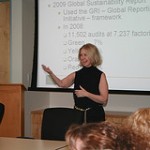What does it mean to be professional? I remember many years ago interviewing for a job in the computer industry, which at the time was considered “para-professional;” in other words, a support staff position.
The more encompassing meaning of this word refers to how we conduct ourselves toward other people, and our self-presentation while we’re doing it. This concept is especially important for individuals in senior positions (those who are expected to set the example).
In his book “The Success Principles: How to get from where you are to where you want to be” Jack Campbell describes the importance of being a “class act,” one which others want to emulate as a positive referent. Class acts (according to Campbell) engage in the following behaviors:
- Live by their own highest standards
- Maintain dignity and grace under pressure
- Focus and improve the behavior of others
- Operate from a larger, inclusive perspective
- Increase the quality of every experience
- Counteract meanness, pettiness, and vulgarity
- Take responsibility for their actions and results
- Strengthen the integrity of all situations
- Expand the meaning of being human
- Increase the confidence and capabilities of others
Professionals (and class acts):
- Are tactful; they practice the art of “stepping on someone’s shoes without ruining their shine. They
- Take the high road and say what they mean [note: no one likes to deal in double entendres]
- Give back, instead of taking advantage. Ask yourself: what exactly are you trying to achieve: is it to enhance someone else, or is it simply to put points in your back pocket?
- Never lower themselves to engage in a dogfight. When in doubt, sit on an e-mail for twenty four hours before responding. Although “flaming” may vanquish ill feelings in the moment, it may cause irreparable damage to a relationship.
- Challenge themselves with self-development and divestiture of bad habits
- Don’t discuss other people behind their backs
- Are transformative agents which change the atmosphere
Strength isn’t exemplified by brute force, but by a thousand little acts of kindness. I think that class acts have learned to behave from a collective, as opposed to an egocentric perspective. Intimate relationships (with intimacy defined as a minimization of differences to achieve consensus and friendship (Tannen, 1986)) are key to consistent peak performance.
Tom Chapell (CEO of Tom’s of Maine) refers to the mindset that allows managers to behave dictatorially, bureaucratically, and without regard for others’ feelings as I-It. Leaders must appear humble to affect revolutionary corporate change. William Pollard, former CEO of ServiceMaster asks, “Will the real leader please stand up? Not the president but the role model. Not the highest paid person in the firm, but the risk taker. Not the person with the most perks, but the servant. Not the person who promotes himself, but the promoter of others. Not the taker but the giver. Not the talker, but the listener.”
In Leadership is an Art, DePree (1989) describes what he sees as a void of personal responsibility, emotional maturity, and sense of equality at the top. In a similar vein, Warren Bennis argues that reliability, or constancy, is an essential determinant of trust, and that loyalty and creativity spring forth from an environment that is respectful and egalitarian (1993). It takes a professional to promote this kind of environment – one who has chosen to the standard bearer for other people.
_______________________________________________________________________________
References
Bennis, W. (1993).Learning some basic truisms about leadership: Emerging strategies for leadership and organizational change. In The New Paradigm in Business: Emerging strategies for leadership and organizational change, M. Ray & A. Rinzler (Eds.), pp. 72-81. New York, NY: Tarcher/Putnam.
DePree, M. (1989).Leadership is an art. New York, NY: Bantam Dell.
Tannen, D.(1986). That’s not what I meant. Canada: Ballantine Books.





Hi that’s a very fascinating view, It does offer one food for thought, I am terribly delighted I chanced on your blog, i used to be using Stumbleupon at the time, anyway i don’t want to drift on an excessive amount of, but i would like to say that I will be back when I have a very little time to read your blog additional exhaustively, Once again thanks for the post and please do maintain the great work,